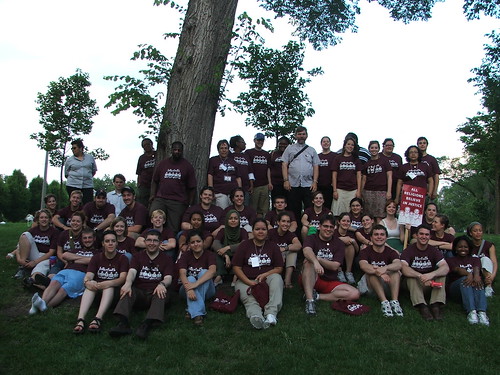I’m beginning to realize that a big part of me really loves words and especially words turned into well worded evocative slogan, especially when that phrase or slogan is deep enough with meaning to provoke action. At our IWJ annual retreat last week, I encountered a phrase spoken by someone so deeply connected with the movement that I could not ignore it. Two of my colleagues from IWJ and I were leading the opening event of the retreat, a discussion of the book The Big Squeeze by Stephen Greenhouse. I was concerned that the discussion would be boring or deal with surface issues only, as I knew there was so much on people’s minds about what needed to get done on the retreat, outside of an assigned book discussion. I should have remembered that this was a gathering of men and women neck deep in the struggle for worker justice, a group who were surely ready to reflect on their everyday experiences. Keron Blair, a recent seminary grad and the freshly minted director of the New Orleans IWJ affiliate, was ready to reflect. In discussing his reaction to the stories of abuse, rights violations, victory and defeat in The Big Squeeze, Keron forcefully asserted in his lilting Jamaican inflected English that we must call ourselves and the religious and other communities we seek to mobilize on behalf of low wages to a hermeneutics of liberation. It has been over a week since I heard that phrase, and I am still challenged and even haunted by it. A “hermeneutics of liberation” seems to be a call to view the world, our struggles, and our campaigns through the ever present lens of liberation. How does this campaign, this organizing effort, that conference call or one on one contribute to the never ending process of liberation? What I am liberating myself, my co-workers, the workers I am working for and even the employers we are working against from? What are the structures of oppression that bind us all in a dance of violence and exclusion? These are deep, profound, and complicated questions, but they seem to me to be the right questions and the right framework to approach the world.
Liberation is a messy thing. It implies that all involved in the organizing process need to be freed from something. It also means that the more “successful” an advocate or organizer is, the less control she has over the process. Liberation is not me pushing my child in a stroller, teaching her about the world around her while I control where she goes, even if she can argue with me about it and maybe change my mind. I picture liberation as my daughter dragging me along by the arm, running ahead, behind, around, and all over freed to explore her own world. Liberation is a messy thing, but it seems to me that it is the goal we must strive for, above and beyond and through the (worthy) goals of increased union density, procedural justice, and even empowerment.
We were challenged at the end of the retreat to express our hopes and dreams for both IWJ and ourselves the work. It was a bit of an awkward situation for me personally, as I was encouraged to apply for various positions within IWJ to work at least on an interim basis. I have been sorely tempted to jettison the prospect of papers, reading, and accompanying 60 Tuftsians for working with the worker center network. I was reminded, however, of the story of Esther. Mordecai, when he comes to Esther to ask her to intercede on behalf of the Jewish people who are to be exterminated the next day, says (more or less) “for perhaps it is for such a time as this that you have been place here for the salvation of your people.” And I think that’s how I have to view this summer as a “for such a time as this” moment, where I have been placed in these 11 weeks to accomplish something and that beyond that I do not know what my upcoming “place” reveals about my role in the struggle for worker rights, but I know that I’m here now. It’s also interesting that Esther plays only a small (but nowhere near minor) role in the book named after her. She appears for a bit, but the action revolves around Mordecai, Haman, and others. It seems that even bit players, there in the right place and at the right time, willing to take advantage of the opportunity and liberated from the need for self-aggrandizement can play important roles in the struggle for liberation.
-Jacob
Monday, July 28, 2008
Subscribe to:
Post Comments (Atom)



No comments:
Post a Comment